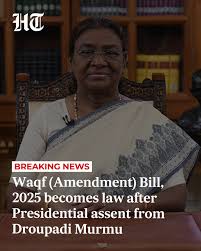


Legal Points in Favour of Amenement
The Waqf (Amendment) Act, 2025 introduces several legal reforms aimed at enhancing the management and oversight of waqf properties in India. Key points in favor of this amendment include:?
1. Enhanced Transparency and Accountability
Digitization of Records: Mandates the digitization of waqf records to curb corruption and ensure transparent management.
2. Inclusive Representation
Diversified Waqf Boards: Requires the inclusion of non-Muslim members in Waqf Boards, promoting interfaith dialogue and broader community involvement. ?
Gender Inclusivity: Mandates the representation of at least two Muslim women on both Central and State Waqf Boards, ensuring gender diversity in decision-making. ?
3. Clarification of Property Ownership
Government Property Exclusion: Specifies that any government-owned property mistakenly recorded as waqf will cease to be classified as such, preventing potential legal disputes.
4. Streamlined Dispute Resolution
Revised Tribunal Structure: Reforms Waqf Tribunals to consist of a District Court judge and another member, enhancing the efficiency and expertise in resolving waqf-related disputes.
Appeal Provision: Allows decisions made by Waqf Tribunals to be challenged in the High Court within 90 days, ensuring a structured appellate mechanism. ?
5. Improved Survey and Registration Processes
Role of District Collector: Transfers the responsibility of conducting waqf property surveys to the District Collector, aiming for more authoritative and organized assessments. ?
Centralized Registration: Introduces a central portal for waqf registration, streamlining the process and reducing bureaucratic hurdles. ?
These amendments are designed to modernize waqf management, promote inclusivity, and ensure the efficient and transparent administration of waqf properties in India.
Legal Points Against Amendment
?The Waqf (Amendment) Act, 2025 has elicited significant criticism from various stakeholders. Key legal points raised against the amendment include:?
1. Inclusion of Non-Muslim Members in Waqf Boards
Potential Violation of Religious Autonomy: The amendment mandates the inclusion of non-Muslim members in Waqf Boards, which critics argue infringes upon the Muslim community's constitutional right to manage its religious endowments independently, as protected under Article 26 of the Indian Constitution. ?
2. Transfer of Survey Responsibilities to District Authorities
Risk of Government Overreach: By assigning the responsibility of surveying Waqf properties to District Collectors or Magistrates, there is concern that this could lead to increased government control over Waqf assets, potentially compromising their autonomy and opening avenues for state appropriation. ?
3. Abolition of 'Waqf by User' Concept
Threat to Long-standing Religious Sites: The removal of the "waqf by user" provision, which recognizes properties as Waqf based on long-term religious or charitable use without formal declaration, may endanger numerous historically significant sites lacking formal documentation. This change could lead to disputes over the status and ownership of such properties.
4. Restrictions on Waqf Creation by Non-Muslims
Contradiction with Established Legal Precedents: Reinstating restrictions that only Muslims can create Waqf properties, and specifying that the individual must have practiced Islam for at least five years, contradicts previous legal precedents that allowed non-Muslims to establish Waqf. This provision is viewed as a violation of property ownership rights.
5. Potential for Increased Litigation
Ambiguities Leading to Legal Disputes: The amendments introduce provisions that could result in reclassification of existing Waqf properties, potentially leading to extensive legal battles and undermining the principle of Waqf perpetuity. ?
6. Impact on Social Services Provided by Waqf Properties
Disruption of Community Welfare Activities: Many Waqf properties serve as centers for education, healthcare, and other social services. Changes that threaten their status or management could disrupt these essential services, adversely affecting marginalized communities that rely on them.
These concerns highlight the need for a comprehensive review of the Waqf (Amendment) Act, 2025, to ensure that it aligns with constitutional protections and safeguards the interests of the communities it impacts.
Once a matter is sub-judice it is advisable to not to provide any opinion on the matter on any public platform.